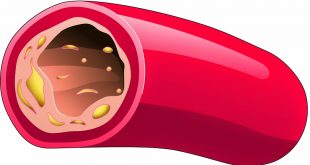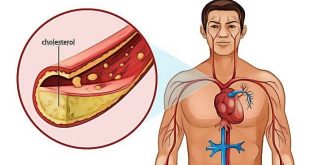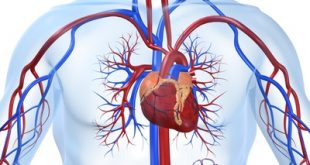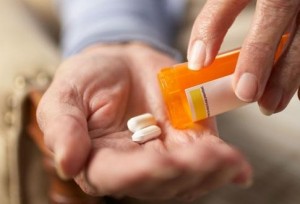
Studies showed that patients with chronic diseases have low adherence to medications. In Malaysia, for example, hypertension patients at health clinics have low adherence in which only 53.4% of patients have good adherence to medication. A study also found that over 50% of diabetes patients do not adhere to treatment. Poor adherence to medication may result in poor control of blood pressure thus will lead to complication such as stroke.
“I always forgot to take my hypertension pills that need to be taken before meal”. “I always forgot to take my cholesterol medication because I always fall a sleep at night”. These are the common statements that are often heard by healthcare professional such as doctors and pharmacists. These behaviours represent non-adherence behaviour to medication. According to World Health Organization (WHO), adherence can be defined as “the extent to which a person’s behaviour – taking medication, following a diet, and/or executing lifestyle changes, corresponds with agreed recommendations from a health care provider”.
Why Don’t Patients Adhere To Medications
Most patients do not understand the purpose of taking medicines. Some also do not believe that medicines can actually help to control their disease. Some are in the state of denial even though they have been diagnosed with the disease. For example, patients with hypertension and diabetes don’t have symptoms that interrupt their everyday life, so it’s easy for them not to follow the prescribed treatment regimens. Non-adherence to medication may lead to terrible consequences. Some even trust the comments made by friends or relatives that taking anti hypertensive and anti diabetes medications for a long time can cause kidney damage. These rumours will just harm themselves. This is because, uncontrolled blood pressure and glucose level itself that lead to complication of kidney failure.
If you find it is difficult to remain adhere to the treatment schedule, ask for more details from your doctor or pharmacist. Identify how the drug works and the side effects that you might experience. For example some hypertension medications such as diuretic group work to lower your blood pressure by reducing the water content in the body. As a side effect, the patient may feel tired, dry mouth and excessive urination. If the patient does not understand that excessive urination is the way the medicine acts, patient may find that difficult and this will lead to non-adherence. If you talk to your doctor or pharmacist, you can reduce the discomfort caused by taking this medicine after meal in the morning and if it’s more than once a day dosage, take your last dose before 6 pm.
Here are examples of different types/groups of anti hypertension medicine, the way it acted, the side effects and how it should be taken.
| Types/group of Medicine | Mode of action | Side effects | How to take |
| Angiotensin Converting Enzyme Inhibitor / ACE-Inhibitor
(example: perindopril, lisinopril) |
Inhibits the production of chemicals in the body that causes constriction of blood vessels, increasing the heart’s ability to pump | non-productive cough, nausea and dizziness | Take 30 minutes before breakfast |
| Calcium channel blocker (example: amlodipine, felodipine) | Affect the movement of calcium into heart cells and blood vessels, relaxing blood vessels, improve blood supply and oxygen to the heart and reduce the heart’s workload | constipation, nausea, dizziness, swelling of the feet | Take before or after eating a light meal (food that is not high in fat or carbohydrates contents), take in the morning |
| Angiotensin-receptor blocker (example: losartan, valsartan, irbesartan) | Reduce the heart’s workload | Cough, sore throat, difficulty in breathing | Take after meal, take early in the morning |
| Beta-blocker (example; atenolol, metorolol) | Reduce blood pressure, reduce the heart’s workload and helps the heart to beat more evenly | Drowsiness, dizziness, body weakness | Take before / after meals |
| Alpha blocker (example: prazosin) | Lowers blood pressure by relaxing the blood vessels | Hypotension, dizziness, palpitations, nausea | Take an initial dose at bedtime, take after meal |
| Diuretic
(example: hydrochlorothiazide) |
Reduce blood pressure by reducing the water content in the body | Confused, thirsty, tired, can cause excessive urination. Take the medicine in the morning to avoid the need to go to the toilet more often at night | Take after meals in the morning.
If the dosage is more than once a day, take the last dose before 6 pm. |
Note: Mode of action of anti-hypertensive drugs (Pharmaceutical Services DivisionMinistry of Health, Malaysia, 2010). Medication Therapy Adherence Clinic Module 2.
Mode Of Action Of Anti-Hypertensive Drugs
Remember, that not all patients will face the side effects of the medicine that stated in the table above. Usually, the side effects will be gone after some times. If the side effects are too serious and make you feel difficult to adhere the medications, talk to your doctor about this.
Benefits Of Adhering To Medications
There are many benefits if you adhere to medications. A study conducted among patients with hypertension in Malaysia showed that blood pressure control was better among those who adhere to medication compare to those who non-adhere to medication. Whereby the mean reading of systolic and diastolic are significantly higher in the non-adhere patients.
In addition, adherence to medications can also reduce the wrong way of taking medicine. For example, take an initial dose of prazosin during the day will lead to a more significant hypotensive effect. This could result in patients experiencing symptom of “orthostatic hypotension” such as weakness, dizziness, lightheaded and maybe even faint. “Orthostatic hypotension” is a condition of low blood pressure that happens when you stand up from sitting or lying down abruptly.
Among the implications of non-adherence to medications are drug wastage, deterioration of disease, lack of quality of life and increases medical costs, such as medical examination cost, the cost of care in the hospital and also increases the rate of hospital admission.
What Should I Do If I’ve Missed A Dose
What you should do if you miss a dose of medication. Generally, if it is almost time for your next dose, please skip the missed dose and take the next dose when you are meant to. Otherwise, take the dose as soon as you remember, and then resume to taking it as you would normally. Remember, do not double the dose. Double the dose may increase the chance of getting unwanted side effects due to overdose such as hypotension and dizziness for hypertension patients and hypoglycaemia for diabetes patients. If you are not sure what to do after missing a dose, contact your doctor or pharmacist for advice. Knowledge about these things can reduce your anxiety and in some cases can avoid the unwanted adverse effects.
Ways To Increase Medication Adherence
There are many ways to improve medication adherence. Here are some of the ways that you can do:
- Know your medicine. Knowing the function and importance of your medicine will make it easier for you to adhere to it.
- Take your medications at the same time every day.
- Relate your medication consumption with your daily activities. For example, take your hypertension medication after breakfast and your cholesterol medication before bed.
- You can use the “pill box” that can facilitate you to take medication. There are many types of pill box either for daily or weekly use. Get the pill box that will suit your needs.
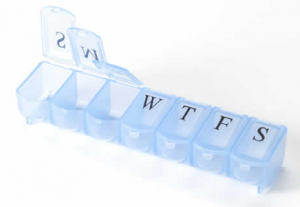 |
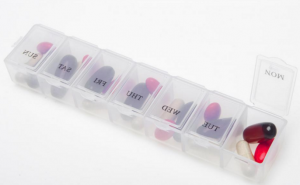 |
An Example Of Weekly Pill Box
- Use the alarm on your clock or telephone to remind you to take medicine on time or you can download the suitable application on your smartphone that can warn about medication adherence and shows a list of drugs that can be checked daily.
 |
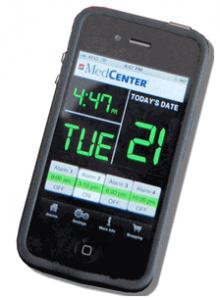 |
- You can discuss with your pharmacist to make a time-table for your medications so that it can ease the process of medication consumption. Especially if you are taking several medicines at different times every day. For example:

Weekly Medicine Schedule
- Use special tools such as pill cutter or pill crusher to cut or crush the medication if necessary to facilitate the process of taking medications.
- Find the motivation and inner strength in yourself to always adhere to the medications in order to stay healthy for yourself and your family.
In conclusion, adherence to medications is very important. If you have problems to remain adhere to your medications, please talk to your doctor or pharmacist. They can provide an alternative or choice of drug regimen, taking medication at a right time to minimize the side effects and other advice for you to make you adhere to your medication regimen. The choice is in your hands. Will you adhere to your medications?
References
- Ahmad, N. S., Ramli, A., Islahudin, F., & Paraidathathu, T. (2013). Medication adherence in patients with type 2 diabetes mellitus treated at primary health clinics in Malaysia. Patient Preference and Adherence, 7, 525–530.
- Col N, Fanale JE, Kronholm P.(1990).The role of medication noncompliance and adverse drug reactions in hospitalizations of the elderly. Arch Intern Med, 150(4),841-845.
- Mayo Clinic Staff (2014). Orthostatic Hypotension (postural hypotension). Retrieved October 25, 2015, from http://www.mayoclinic.org/diseases-conditions/orthostatic-hypotension/basics/definition/con-20031255
- MediResource Inc.(2015). Coversyl. Retrieved November 11, 2015 from http://www.medbroadcast.com/drug_info_details.asp?brand_name_id=83#.VjnQ6bcrLIU
- MediResource Inc.(2015). Auro-Amlodipine Retrieved November 11, 2015 from http://www.medbroadcast.com/drug_info_details.asp?brand_name_id=6485#.VjnSCrcrLIU
- Pharmaceutical Services Division Ministry of Health, Malaysia. (2010). Cara tindakanubat anti-hipertensi. Diabetes Medication Therapy Adherence Clinic Session 2.
- Ramli, A., Ahmad, N. S., & Paraidathathu, T. (2012). Medication adherence among hypertensive patients of primary health clinics in Malaysia. Patient Preference and Adherence, 6, 613–622.
- Sokol MC, McGuigan KA, Verbrugge RR, Epstein RS.(2005). Impact of medication adherence on hospitalization risk and healthcare cost. Med Care, 43(6), 521-530.
- Sullivan S, Kreling D, Hazlet T. (1990). Noncompliance with medication regimens and subsequent hospitalizations: A literature analysis and cost of hospitalization estimate. J Res Pharmaceut Econ, 2,19-33
- World Health Organization (WHO). (2003). Adherence to Long-Term Therapies – Evidence for action. WHO Library Cataloguing-in-Publication Data.
- Pictures from: http://medimoon.com/wp-content/uploads/2014/09/medication-adherence.jpg
| Last Reviewed | : | 19 July 2016 |
| Writer | : | Dr. Zanariah Binti Abu Bakar |
| Translator | : | Dr. Zanariah Binti Abu Bakar |
| Accreditor | : | Dr. Azura Binti Musa |
 PENDIDIKAN PESAKIT Kementerian Kesihatan Malaysia
PENDIDIKAN PESAKIT Kementerian Kesihatan Malaysia

